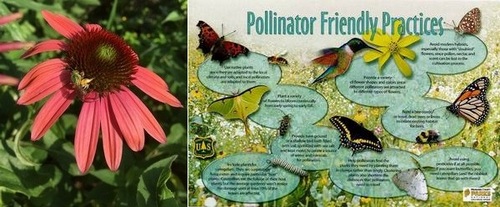Above: Last week, Chestnut Hill Farm tried to raise awareness about pesticide’s impact on pollinators and the food supply. That event followed other events held by organizations in town on similar topics. (image left from CHF blog in 2016, right from SOLF’s Facebook page)
I’m behind again on sharing some Southborough related stories from local news and videos of events in town. One of those stories and three events are close enough in nature to prompt a hybrid roundup.
Last week, the media covered Chestnut Hill Farm’s efforts to educate people about the dangers posed to the food chain by choices they may be making in their yards. In the story, CHF farmer Desiree Robertson-DuBois explained the impact of certain pesticides on farmers’ ability to grow food.
Her interview was at an event to raise awareness about the harm certain neonicotinoids can do to pollinator populations. Supporting pollinators was also the focus of two other public events in May. And a third in June focused on helpful gardening tips for people who want to avoid pesticides.
You can learn more about the threat, and what you can do about it, through the story and recorded presentations below.
A possible threat to the food we eat
July 9, 2018 – Southborough Wicked Local:
“There’s a national crisis now,” Robertson-Dubois said, and she thinks people must know about it.
The cause of that crisis, according to some scientific studies, is neonicotinoid pesticides. They have wide agricultural and consumer use.
Robertson-Dubois said she trusts scientific studies that conclude neonicotinoids are wiping out honey bees, and other pollinators, vital to human – and plant – survival.
″(Pollinators) produce most of our food supply,” she said. “They are absolutely essential, and we should ban neonicotinoids.”
The state’s Pollinator Protection Plan reports that the number of honey-producing bee colonies in the U.S. dropped from a high of 5.9 million in 1947 to 2.3 million in 2008, according to a State House News Report. The Massachusetts beekeepers reported an annual loss of 55.75 percent of honey bee colonies in the 2015-2016 season, placing it among the states with the greatest losses around the country. . .
Honey bees, wasps, drone flies, and Sweat bees were some of the pollinators Robertson-Dubois identified in the flower garden Saturday. They’re part of the food chain, carrying nutrients to crops humans rely on for survival.
Chestnut Hill Farm doesn’t practice broad applications of pesticides, according to Robertson-DuBois. She thinks that practice could be connected to declining numbers of pollinators. Instead, Chestnut Hill Farm, owned by The Trustees, applies pesticides to small areas to target specific insects that destroy crops. (read more)
To fit the videos below in, I made the windows small. But you can click on the full screen icon [ ] in bottom right corner to expand.
The Organic Approach to Vegetable Gardening
June 13, 2018 – The Southborough Library brought in Blackstone Valley Veggie Gardens’ experts to present how to feed your garden and keep away the insects and pests without chemicals.
posted to You Tube by Southborough Access Media
SOLF meeting with “New England Pollinators and How to Support them”
May 9, 2018 – Southborough Open Land Foundation’s annual meeting included the presentation from MassAudubon’s Martha Gach. Before that, SOLF business included recognition of people working to support nature in town. If you want to skip straight to the introduction of the pollinator presentation, click here.
posted to You Tube by Southborough Access Media
Butterfly & Hummingbird Gardens
May 15, 2018 – The Open Space Preservation Commisssion brought eco-friendly gardening expert Ellen Sousa to the library for an interactive presentation encouraging residents to support pollinators. The talk was part of the “Native Pollinator • Native Plant Initiative”.
posted to You Tube by Southborough Access Media



Great article and a very important subject, I believe most would be willing to do their part to not contribute to the problem identified here.
So we can all help, could the specific products presenting a danger to pollinators be identified? Asking consumers to sort through the alphabet soup of chemical ingredients listed on pest control products so they can avoid using “certain neonicotinoids” is a tall order.
It would have everyone to “bee” aware…..
My entire yard is flowers, fruit trees and vegetable gardens. I also live close to wetlands. I do not use any pesticides. If the bugs eat my stuff so be it – I can buy it at Whole Foods. Farmers old rule of thumb, I plant 1/3 extra for the birds and animals. There are ways naturally to disarm pests or at least mitigate. For instance, remove the bottom third of your tomato plants and you will see most pests disappear. Support bats and dragon flies, You will think I am nuts but the dragon flies know me and my kids will tell you when I go to the gardens they start to swarm. Why? Because I take 1 minute and use my garden hose to mist the air and the plants. Bat houses not only in your yard but just in the woods line are very helpful. Cheap too. Honey bee hives, and there are some very neat creations today, are great to support bee life, One I recently looked at is , http://www.honeyflow.com
My two cents….